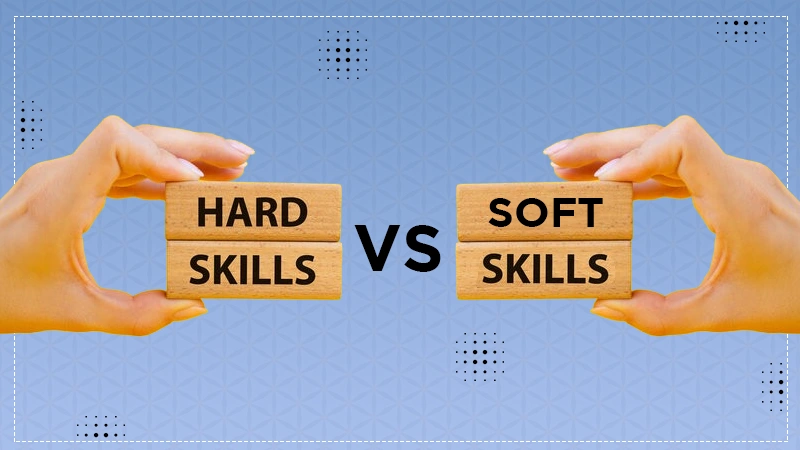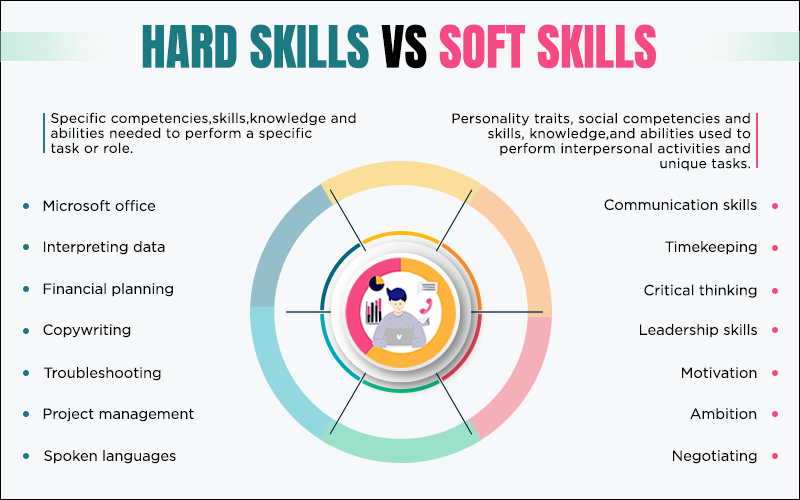
Skills define a person’s ability to maneuver various tasks and challenges to achieve their life goals. It reflects your personality, psychological traits, and approach to things.
Skills can be classified into 2 categories: soft skills and hard skills. Soft skills are defined as those abilities that allow an individual to navigate social situations. Hard skills, on the other hand, are specific abilities that can be learned and applied to a particular field or job.
Let’s take a deep dive into the concept of hard skills vs soft skills to understand the differences, how to develop them, and how to maximize potential.
What is the Difference Between Soft Skills and Hard Skills?

The key difference between both lies in their nature and the process required to develop them over time. One is related to the technical aspect and the other is more psychological, which boosts your productivity and maps out the systematic approach to handling certain tasks.
So, without further ado, let’s look at the detailed definitions and understand the difference between soft and hard skills, along with some examples.
Soft Skills
Soft skills are traits, or perhaps part of your inherited qualities. These abilities are ingrained in a person’s behavior, attitude, and thought process. It influences how they interact with coworkers and clients, as well as how they respond to certain circumstances and confrontations.
With soft skills, individuals can foster professionalism in the workplace and form healthy relationships in and outside the professional workplace. It also helps them to adapt to dynamic environments and embrace new challenges.
It is generally more psychological, with a personalized touch, because two people’s reactions to a given situation will never be identical. Let’s understand more clearly with the help of examples.
Soft Skills Examples
Soft skills have a unique touch to them and cannot be taught through literature or assessments. Examples of soft skills are:
- Motivation
- Leadership
- Time Management
- Problem-solving
- Strategic thinking
- Teamwork
- Adaptability
- Persuasive
- Critical Thinking
These are a few examples of soft skills; these skills won’t directly influence your pay scale, but inheriting these skills makes you a valuable asset for a firm. Moving forward, let’s check out what hard skills are and some of their examples.
Also Read: Top 6 Personal Training Books to Maximize the Potential
Hard Skills
Hard Skills are usually technical skills or job-specific abilities. When compared to soft skills, hard skills are more tangible and often require specific knowledge or experience.
They require expertise in things like graphic design, software operation, data analysis tools, accounting concepts, operating machines, and so on. Hard skills are generalized in nature, with similar sets of rules that cannot be easily customized.
Hard Skills Examples
Hard skills require experience and working on a professional level to gain proficiency, examples of such skills are:
- Coding
- Data Analytics
- SEO/SEM Marketing
- Sales or Business Analysis
- Financial Management or Bookkeeping
- UX design
- Art & Craft
- Excel
- Writing
- Web Development
These are a few examples of hard skills, and you should now have a clear understanding of what technical skills are and how they affect your pay scale.
Both skills are unique and require different approaches to develop your command of them. Let’s move one step further and learn how to acquire hard and soft skills and understand the concept in a better way.
Also Read: Level Up Your Skills: Online Resources to Power Your Academic & Professional Success
How to Acquire Hard and Soft Skills?
In hard skills vs soft skills, the major difference is the process of acquiring them. Hard skills require the necessary formal education, training, or real-world experience, and are distinctive to a given sector or profession. These skills can be acquired through courses, apprenticeships, or working in a professional setting.
Skills such as coding, data analysis, and others are being taught at various institutes and universities. After completing the curriculum, you will be awarded a certificate through which you can work under an organization.
Hard skills can be polished through work experience and working on new tasks that sharpen your skills. Additionally, hard skills don’t necessarily require you to be present in a professional environment. Pilots, doctors, traders, and other professionals can also be trained through simulation.
On the other hand, soft skills cannot be learned or acquired through paid courses or universities. It can only be developed through his/her own experience if given the opportunity.
For example, a person cannot develop his leadership quality and improve communication skills if not allowed to do so. Soft skills are acquired through a more practical approach and personalized touch.
Moving on, let us talk about which skill you should prioritize and value more in both dimensions.
Hard Skills vs. Soft Skills: Which Skills Are More Important?
It won’t be fair to give preference to anyone, as they both are required for the holistic development of a person. Each plays a unique role in shaping a person’s characteristics and ensuring success in professional development.
As a fresher, organizations may not emphasize your hard skills because of limited professional experience. In such cases, your soft skills, such as communication, teamwork, time management, and problem-solving abilities, will be tested.
| Hard Skills | Soft Skills |
| Develops your technical skills and ability to perform a certain task. | Develops your personality and problem-solving ability. |
| Improves technical ability. | Improves cognitive ability. |
| Can be polished through various means such as practice, working in an organization, taking coaching from institutes, etc. | Can only be polished through real-life situations. |
| Have a universal code of conduct and can only be altered to a certain degree for example a developer can change the platform to run codes but cannot change the actual procedure and codes. | Have a personalized touch and can be tailored according to requirements. For example, an employee can strategize how to carry out daily tasks based on the priority of the task or based on the timeframe of the work. |
As an experienced employee, the organization expects you to be proficient in both hard and soft skills. In short, as an experienced worker, you should have a well-rounded skill set. It includes both strong soft skills and technical competence, even though hard skills may still play a big role. Your viability and appropriateness for senior-level positions inside the company will substantially increase if you can demonstrate skill in both areas.
Conclusion
Finally, we have concluded the concept of hard skills vs soft skills. The definitions of hard and soft skills differ, but they are both interrelated. A person may excel in technical skills, but with proficiency in soft skills such as adaptability, teamwork, and time management, it becomes easier to enhance productivity.
Conversely, a person might have assertive communication skills or might be a good leader, but without any technical skills that person cannot contribute effectively in roles that require specific technical expertise.
Therefore, versatility is a bonus, an employee might not excel in both areas, but having some degree of experience and expertise enhances your value in the organization.
Read Next: 27 Professional Goals Examples for a Prosperous Career
FAQs
Ans: Specific knowledge or ability to carry out a task or a job can be identified as hard skills. For example, acquiring backend skills to carry out API testing is an example of hard skills.
Ans: Creativity, problem-solving ability, teamwork, adaptability, and self-initiative are some of the most demanding soft skills.
Ans: There are several tests and assessments to determine one’s skills such as aptitude tests, situation judgment, group discussion, and simulation are some ways to test skills.
Ans: Blockchain development, cloud computing, artificial intelligence, data analysis, and sales are some of the highest-paying technical skills.
Ans: Hard skills can be easily acquired by taking online courses, attending university, and working as an intern or apprentice.
Ans: Make sure your hard and soft skills are properly categorized and highlighted in your resume. You can take the help of a template and make sure your hard skill experiences are mentioned first.
Sources:
Soft Skills vs. Power Skills: Difference –
Forbes